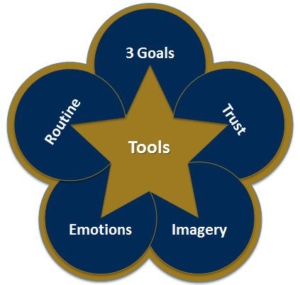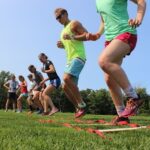 This post, related to mental tools, is the last of my five-part series describing my Prime Performance System which encompasses everything I know about the psychology of ski racing. It also acts as the foundation for my upcoming 12-week online mental training program (begins June 1st!).
This post, related to mental tools, is the last of my five-part series describing my Prime Performance System which encompasses everything I know about the psychology of ski racing. It also acts as the foundation for my upcoming 12-week online mental training program (begins June 1st!).
This post will introduce five practical mental tools you can use to get the most out of your skiing on race day. These five mental tools are the final piece of the prime performance puzzle that enable you to take the four previous parts of my Prime Performance System (Attitudes, Obstacles, Preparation, Mental Muscles) and focus them entirely on what you need to do to ski your fastest when it counts most, namely, in your biggest races of the season. Importantly, these mental tools allow you to take the leap from fast skiing in training to fast skiing in races. The five mental tools (as noted in the image above) are emotions, imagery, routines, trust, and 3 goals.
Emotions
On race day, you may experience a myriad of emotions, some pleasant and helpful, others less so. Emotions that will help you ski fast include inspiration, excitement, and pride. Emotions that will prevent you from skiing fast include fear, frustration, disappointment, and worry. I have found that, in my own ski racing experience (back in the day) and in my work with racers over the years, it is emotions, not natural ability or fitness or training (though all are necessary), that make the difference between skiing your best and achieving your race goals and not.
Of all the mental areas in which I work with athletes, emotions are perhaps the most challenging to understand and change because they are a reaction to your attitudes, beliefs, and perceptions about the race that you take with you into the starting gate. Whatever negative emotions you experience before a race, they are difficult to change in the start area. Ideally, you want to alter those attitudes, beliefs, and perceptions that lead to the unpleasant emotions before you get to the race, so those emotions don’t arise. Moreover, you want to establish a way of thinking about the race that will generate positive emotions that will drive you to fast skiing.
Imagery
Mental imagery is the most powerful mental tool at your disposal. It involves seeing and feeling yourself preparing for and skiing the way you want in a race many times over before you get to the race. Though it should be used frequently both on and off the hill during your prep period, it is a vital tool on race day to put you in that ideal state of mind and body that will allow fast skiing to emerge.
Imagery offers so many benefits on race day. It helps you to program your mind and body for how you want to ski. Imagery instills confidence by seeing and feeling yourself skiing really fast. It narrows your focus onto what you need to do to ski your best and blocks out distractions that can take you out of your zone. Imagery primes your body so that when you get into the gate, it is ready to go all out from start to finish. Finally, as Mikaela Shiffrin noted before her Olympic slalom victory in Sochi, repeatedly imagining yourself skiing in a race enables you to feel, when you get into the starting gate, that you’ve already skied fast in the race, so the actual race doesn’t feel like a big deal.
You can use imagery in several essential places on race day. First, do imagery as one of the first things you do when you get up in the morning. Imagining yourself skiing fast and having a great race sets the tone for the day, getting you excited and positive about the day. Second, during inspection, ingraining the course and how you want to ski it. Third, in the start area as a part of your pre-race routine, in which you prime your mind with great confidence, focus, and mindset. Finally, just before you slide into the gate, giving you an extra boost of good images and feelings for you to take with you as you leaving the starting gate.
Routines
I don’t know a World Cup racer who doesn’t have a clearly defined pre-race routine that they go through before every race. Why? Because routines provide you with many benefits to help you ski your fastest on race day. First, your routine is comprised everything you need to do to be totally prepared to ski your best. A well-ingrained routine triggers feelings of confidence and comfort even in the biggest races because it sends the message to your mind and body that this is just another race you are getting ready for. Third, it provides feelings of familiarity, predictability, and control, all of which increase your ease and combat doubts and nerves that might creep in before the start of a race.
The challenge with routines is that there is no single ideal routine for everyone. For every World Cupper, there is a routine that meets their own unique psychological, emotional, and physical needs. Yet, they all include the same basic elements: equipment, physical, and mental. You want to figure out what you need to do in those three areas to ensure that you are prepared in every way to ski your fastest.
A routine isn’t something that you will develop in one race. Rather, it involves a process of experimentation to help you decide what works best for you. In time, you will find precisely what you need to do to feel physically and mentally ready to ski your fastest.
Trust
Most people wouldn’t think of trust as a mental tool because it isn’t something you do, like imagery or a routine. In a way, trust comes from some things you don’t do, namely, thinking, trying, and controlling. The reality of ski racing is that there isn’t time think, analyze, or control when you’re on course. If you get stuck in your head, you’re bound to ski slowly.
Trust involves having a basic belief that you have prepared yourself to achieve your goals and your body will do what you have trained it to do, in this case, ski fast. It also includes a fundamental faith that, if you give your best effort, good things will happen. Trust enables you to approach races with confidence, commitment, and courage, and without fear, doubt, or worry.
For you to have complete trust in your skiing when you get into the starting gate, you must have established trust in every aspect of your skiing including your fitness, technique, tactics, equipment, coaching, mind, and preparations.
The difficulty with trust is that it takes time to develop. You must have physical, skiing, and mental training programs that you believe will lead you to your goals. You can begin to trust yourself in less important situations, such training, and gradually build your confidence until you feel complete trust in your skiing in big races. Ultimately, trust takes a leap of faith because there are no guarantees that it will pay off. As a result, you can’t trust yourself until you take the risk of trusting yourself. But when you do finally trust yourself, you will ski your fastest and the results will come.
3 Goals
This final part of my Prime Performance System culminates in using three goals that, if you can focus on and achieve them, you will, over time, ski fast and very likely will accomplish your ski racing goals. These three goals are mental tools because they are based in the process of what you need to do to ski your best, and are controllable and very practical.
Goal #1, in the starting gate, involves being able to say to yourself, “I’m as prepared as I can be to ski my fastest.” Of course, total preparation doesn’t guarantee you will get a good result, but not being totally prepared certainly guarantees that you won’t ski fast or get the result you want.
Goal #2, on course, means ‘bringing it’ every run, in other words, attacking and going for it from start to finish. Bringing it is risky and you may not get the result you want because when you push your limits, you may either make a mistake or DNF. But, just like not being totally prepared, not bringing it pretty much guarantees you won’t ski fast or get a good result.
Finally, Goal #3, at the finish, involves no regrets because you left it all out on the course. Have you ever had a race in which you felt like you really needed to finish, so you skied cautiously and you did finish. But when you look at your slow time on the clock, you kick yourself for not going for it? Having no regrets can still be disappointing because you may make a mistake or DNF. But there is still pride in having given it your all. As with the previous goals, you may not get the result you want every race because of the risks involved in no regrets, but, over time, good things will happen. And, again as with the two other goals, if you have regrets at the finish, not only will you definitely not ski your fastest or achieve your ski racing goals, but you will also feel terrible because you weren’t well prepared, you didn’t bring it, and you will feel regret that can last a lifetime.
Want to get your mind in the best shape of your life? Learn more about my new 12-week online mental training program. This 12-week live and interactive program takes everything I know about the mental side of ski racing and offers it in an organized, engaging, and affordable format. I offer team discounts and coaches can attend for FREE with an enrollment of 15 athletes from a team. Plus, parents who want to participate can receive a 2-for-1 couples discount.






